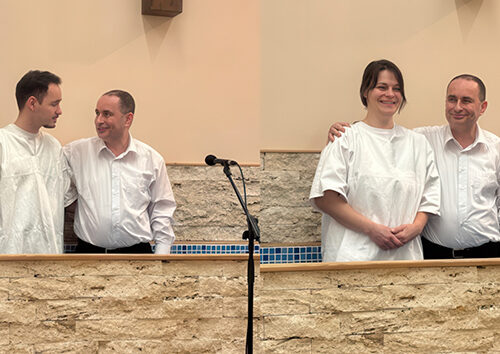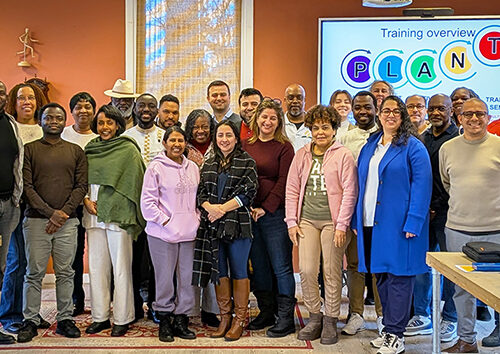15 December 2023 | St. Albans, UK [David Neal]
For all of his working life as a pastor, bible translator, broadcaster and author spanning 50 years, J. B. Phillips struggled to cope with frequent bouts of ‘psychological disturbance and dark depression’. In an age when there was significant stigma and little understanding about mental health, Phillips would ’emerge’ for a while from the ‘dark thoughts and mental pains’ to continue his local and ever-growing global ministry. But before long, as his wife Vera describes in a biography of Phillips, “The Wounded Healer” would be ‘back into the turmoil’. As Phillips would come to recognise, the root of his problem was the attitude his perfectionist father imposed on him, expecting “130%, and if he fell short of this impossible standard, he was a failure in his own eyes.” (1)
Without a doubt, Phillips’s 1952 book “Your God is Too Small” was his attempt to deal with his father’s exacting standard and his “early inadequate conception of God… almost invariably founded upon the child’s idea of his father.” If there was an idea that had to be demolished, it was of the God who was out to ‘get us’, like an English policeman, with his ‘truncheon’ (today’s baton) ready to catch us out and strike the moment we step out of line. To the contrary, Phillips reasoned, “If God is God, He’s big, and generous and magnificent…” (2)
With his parish ministry beginning in 1929 and spanning the Second World War and its aftermath, Phillips was confronted with the post-war world of ‘modernism’ when the authority of the New Testament was being challenged. His response in 1959 was the publication of his translation of “The New Testament in Modern English”, a comparable English forerunner to Eugene H. Peterson’s “The Message”, published 34 years later in 1993. (3)
But another major reason for Phillips’s translation was pastoral, “chiefly for the sake of the young people at that time under my care in wartime London,” recognising that although the 1611 Authorised Version was written with ‘beautiful’ language, its ‘antique’ words were a barrier to understanding the truth about God. As he translated, his conviction about the Christian message deepened. The key moment for him was while translating 1 Corinthians 15:
“For me, the translator, this fifteenth chapter seemed alive and vibrant, not with pious hope, but with inspired certainty. Quite suddenly, I realised that no man (referring to Paul) has ever written such words before. As I pressed on with the task of translation I came to feel utterly convinced of the truth of the resurrection. Something of life-and-death importance had happened in mortal history, and I was reading the actual words of people who have seen Christ after his resurrection and had seen men and women deeply changed by his living power.” (4)
I share this background to give a context to “The Visit”, Phillips’s big story, created to understand the meaning of the first Advent. It is written in such a way that young children hearing the story for the first time have their imagination captured – and ‘wonder’. And for adults of whatever age, there is an invitation to ‘imagine again’, and reflect on the beauty of the gospel which is a never ending story.
For all of my ministry at this time of year, I’ve retrieved this story out of the file – because it resonates so well with the bible’s grand narrative. As I read and reread “The Visit”, I imagine Phillips hammering away with his fingers on an old typerwriter in his pastor’s study, plagued with a clinical issue that disturbs him more than most of us even dare to imagine. Yes, ‘wounded and damaged’ he may have been – and yet he is able to tell the story again that “If God is God, He’s big, and generous and magnificent…”
It is the story we must tell.
The Visit
Scene 1
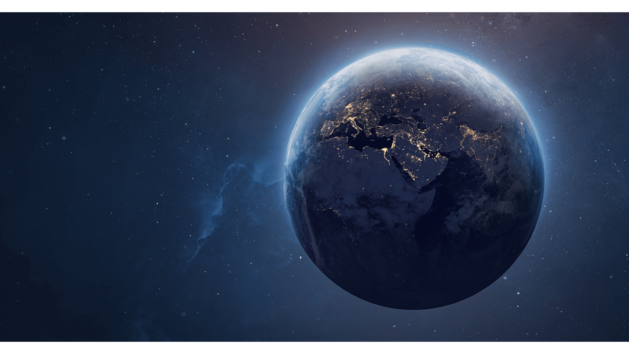
Once upon a time, a very young angel was being shown around the splendours and glories of the universes by a senior and experienced angel. To tell the truth, the little angel was beginning to be tired and a little bored. He had been shown whirling galaxies and blazing suns, infinite distances in the deathly cold of interstellar space, and to his mind, there seemed to be an awful lot of it all. Finally, he was shown the galaxy of which our planetary system is but a small part. As the two of them drew near to the star which we call our sun and to its circling planets, the senior angel pointed to a small and rather insignificant sphere turning very slowly on its axis. It looked as dull as a dirty tennis ball to the little angel, whose mind was filled with the size and glory of what he had seen.
“I want you to watch that one particularly,” said the senior angel, pointing with his finger.
“Well, it looks very small and rather dirty to me,” said the little angel. “What’s special about that one?”
“That,” replied his senior solemnly, “is the Visited Planet.”
“Visited?” said the little one. “you don’t mean visited by ——–?
“Indeed I do. That ball, which I have no doubt looks to you small and insignificant and not perhaps overclean, has been visited by our young Prince of Glory.” And at these words, he bowed his head reverently.
“But how?” queried the younger one. “Do you mean that our great and glorious Prince, with all these wonders and splendours of His Creation, and millions more that I’m sure I haven’t seen yet, went down in Person to this fifth-rate little ball? Why should He do a thing like that?”
“It isn’t for us,” said his senior a little stiffly, “to question His ‘whys’, except that I must point out to you that He is not impressed by size and numbers, as you seem to be. But that He went, I know, and all of us in Heaven who know anything know that. As to why He became one of them – how else do you suppose He could visit them?”
The little angel’s face wrinkled in disgust.
“Do you mean to tell me,” he said, “that He stooped so low as to become one of those creeping, crawling creatures of that floating ball?”
“I do, and I don’t think He would like you to call them ‘creeping, crawling creatures’ in that tone of voice. For, strange as it may seem to us, He loves them. He went down to visit them to lift them up to become like Him.”
The little angel looked blank. Such a thought was almost beyond his comprehension.
“Close your eyes for a moment,” said the senior angel, “and we will go back in what they call Time.”
Scene 2

While the little angel’s eyes were closed and the two of them moved nearer to the spinning ball, it stopped spinning, spun backwards quite fast for a while, and then slowly resumed its usual rotation.
“Now look!” And as the little angel did as he was told, there appeared here and there on the dull surface of the globe little flashes of light, some merely momentary and some persisting for quite a time.
“Well, what am I seeing now?” queried the little angel.
“You are watching this little world as it was some thousands of years ago,” returned his companion. “Every flash and glow of light that you see is something of the Father’s knowledge and wisdom breaking into the minds and hearts of people who live upon the earth. Not many people, you see, can hear His Voice or understand what He says, even though He is speaking gently and quietly to them all the time.”
“Why are they so blind and deaf and stupid?” asked the junior angel rather crossly.
“It is not for us to judge them. We who live in the Splendour have no idea what it is like to live in the dark. We hear the music and the Voice like the sound of many waters every day of our lives, but to them – well, there is much darkness and much noise and much distraction upon the earth. Only a few who are quiet and humble and wise hear His Voice. But watch, for in a moment, you will see something truly wonderful.”
Scene 3
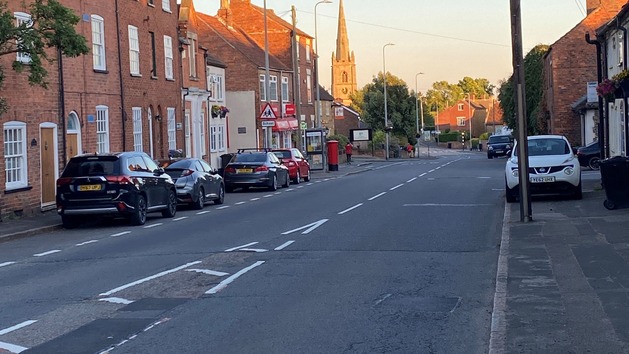
The Earth went on turning and circling round the sun, and then quite suddenly, in the upper half of the globe, there appeared a light, tiny but so bright in its intensity that both the angels hid their eyes.
“I think I can guess,” said the little angel in a low voice. “That was the Visit, wasn’t it?”
“Yes, that was the Visit. The Light Himself went down there and lived among them; but in a moment, and you will be able to tell that even with your eyes closed, the light will go out.”
“But why? Could He not bear their darkness and stupidity? Did He have to return here?”
“No, it wasn’t that” replied the senior angel. His voice was stern and sad. “They failed to recognise Him for Who He was – or at least only a handful knew Him. For the most part, they preferred their darkness to His Light, and in the end, they killed Him.”
“The fools, the crazy fools! They don’t deserve —-“
“Neither you nor I nor any other angel knows why they were so foolish and so wicked. Nor can we say what they deserve or don’t deserve. But the fact remains, they killed our Prince of Glory while He was Man amongst them.”
“And that, I suppose was the end? I see the whole Earth has gone black and dark. All right, I won’t judge them, but surely that is all they could expect?”
Scene 4
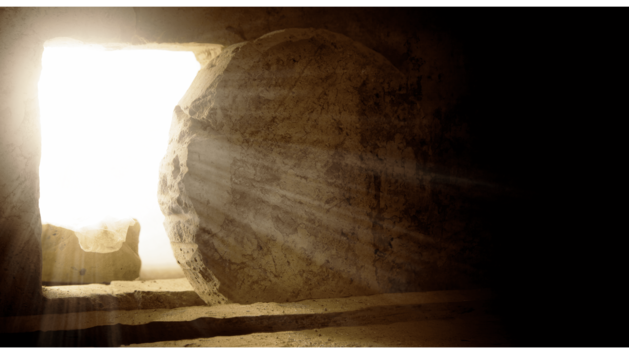
“Wait, we are still far from the end of the story of the Visited Planet. Watch now, but be ready to cover your eyes again.”
In utter blackness, the earth turned round three times, and then there blazed with unbearable radiance a point of light.
“What now?” asked the little angel, shielding his eyes.
“They killed Him all right, but He conquered death. The thing most of them dread and fear all their lives He broke and conquered. He rose again, and a few of them saw Him and from then on became His utterly devoted followers.”
“Thank God for that,” said the little angel.
Scene 5

“Open your eyes now, the dazzling light has gone. The Prince has returned to His Home of Light. But watch the Earth now.”
As they looked, in place of the dazzling light, there was a bright glow which throbbed and pulsated. And then, as the Earth turned many times, little points of light spread out. A few flickered and died; but for the most part, the lights burned steadily, and as they continued to watch, there was a glow over many areas in many parts of the globe.
“You see what is happening?” asked the senior angel. “The bright glow is the company of loyal men and women He left behind, and with His help, they spread the glow, and now lights begin to shine all over the Earth.”
“Yes, yes,” said the little angel impatiently, “but how does it end? Will the little lights join up with each other? Will it all be light, as it is in Heaven?”
His senior shook his head. “We simply do not know,” he replied. “It is in the Father’s hands. Sometimes, it is agony to watch, and sometimes it is joy unspeakable. The end is not yet. But now I am sure you can see why this little ball is so important. He has visited it; He is working out His Plan upon it.”
“Yes, I see, though I don’t understand. I shall never forget that this is the Visited Planet.”
1. The Wounded Healer, J. B. Phillips, by Vera Phillips and Edwin Robertson, Triangle SPCK, 1984, pp. viii and 6.; 2. Your God is Too Small,by J. B Phillips, The Epworth Press, 1952, p. 33.; 3. The New Testament in Modern English, by J. B. Phillips, Cox and Wyman Ltd, 1959.; Ring of Truth, A Translator’s Testimony, by J. B. Phillips, Hodder and Stoughton, 1967, p. 26-27.; 4. The Visit, by J. B. Phillips, has been republished hundreds of times; however, the original publication is unknown. 5. To discover more about the work of J. B. Phillips, visit his website.
[Photos: Shutterstock and David Neal].

